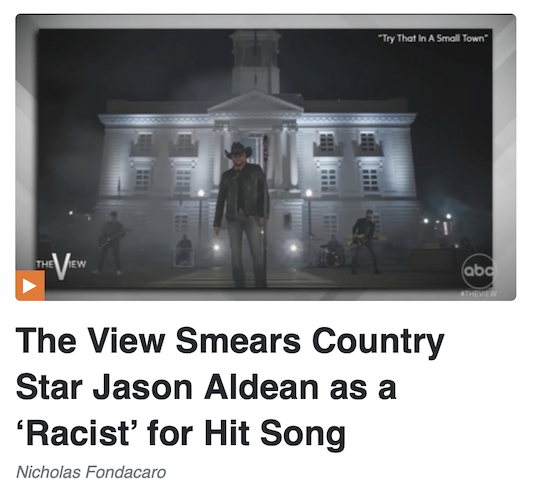Topic: Media Research Center
 For right-wingers, the song of the summer was Jason Aldean's "Try That In A Small Town," which critics argued is a right-wing revenge fantasy in which city folk are dared to come to a small town so they can get what they deserve. Naturally, the MRC got upset what that subtext was pointed out, as NIcholas Fondacaro whined in a July 20 post:
For right-wingers, the song of the summer was Jason Aldean's "Try That In A Small Town," which critics argued is a right-wing revenge fantasy in which city folk are dared to come to a small town so they can get what they deserve. Naturally, the MRC got upset what that subtext was pointed out, as NIcholas Fondacaro whined in a July 20 post:
The liberal media put a target on country music star Jason Aldean this week as they smeared him and his hit song Try That in a Small Town as racist. Despite the lack of evidence and no attempt to show any, the cast of ABC’s The View engaged in their vapid and contemptible hatemongering. In addition to baselessly smearing Aldean with accusations of embracing racially charged mob justice, they attacked small towns as beneath big cities.
Moderator Whoopi Goldberg couldn’t even get the name of the song correct as she introduced the segment at the top of the show. “So, country singer Jason Aldean is getting backlash for the video of his song ‘not in a small town’ [sic], which critics are saying is racist. It’s got lyrics, racist lyrics, and images,” she proclaimed while having something in her mouth.
While the song made no direct mention of Black Lives Matter (lyrics here) and the music video used images from news reports, Goldberg insisted Aldean was exclusively “talking about black people” and outrageously defended the BLM riots as them “taking care of the people in their town” (click “expand”):
[...]
Faux conservative Alyssa Farah Griffin continued to show how absolutely useless she was as she too baselessly accused Aldean of encouraging racist white mob justice. “What I thought of when I read that was Ahmaud Arbery. I think of a black man in a small town in the South who literally got shot for doing nothing wrong,” she proclaimed.
She also whined that his music wasn’t inclusive enough. “So, what I think becomes problematic is that there is a lack of recognition of what this means to about 50 percent of the country whose experience isn't Jason Aldean's,” she whined.
Fondacaro insisted that "Their conversation and hatemongering said more about them and where their heads were at than it did about Aldean, small towns, and the people who like the song," even though he refused to address of the specific concerns they had with the song.
A July 25 post by Tim Graham was a reprint of a rant by Charlie Daniels Jr. that was "sent to Charlie Daniels Band fans to spread the word against the woke mob," which Graham introduced as defending the song's "fierce pushback against woke-ism" and complaining that "people find racism in lyrics that never mention race." Of coruse, one does not have to us explicitly racist language to be racist. Daniels went on to repeat right-wing talking points against Black Lives Matter, since footage of racial justice riots was used in the song's video:
I know there have been problems with police brutality, and I would never say that all cops are good, but I would also stand up to anyone who says all members of the law enforcement community are bad, but here’s what BLM doesn’t want you to know. BLM is Antifa and Occupy Wall Street, etc... They are the militant wing of the leftists which began with radical groups like the Weather Underground from the 1960s.
In fact, BLM co-founder Patrisse Cullors says she and co-founder Alicia Garza are “trained Marxists,” and decried the “nuclear family structure” and aimed to “dismantle the patriarchal practice,” which was later scrubbed from the BLM website.
Not to say that all who have followed the BLM protests and riots are in it to promote the organization's agenda, but the agenda is there whether they realize it or not.
The bottom line is this, neither song mentions race, and both songs are anti-lawlessness, and anti-violent crime, and it’s as simple as that.
Unmentioned by Fondacaro, Graham and Daniels was the fact that the small-town courthouse in front of which Aldean performed in the vdeo was the site of the lynching of a black teenager in 1927 -- suggesting, unintentionally or otherwise, that assertion of one's rights isn't something one should try in a small town. That finally did get mentioned in a July 25 post by Alex Christy, who complained that MSNBC's Andrea MItchell brought it up in a segment discussing the establishment of memorials to Emmett Till, another lynched black teenager:
Mitchell then one-upped herself, “And the second biggest song in the country right now is Try That In a Small Town sung by Jason Aldean whose music video was filmed outside a Tennessee courthouse where a black teenager was lynched 1927 and a race riot took place in 1946. And remember, it was all during Aldean’s Las Vegas performance that a gunman opened fire, killing 60 people in 2017.”
What the 2017 shooting has to do with Aldean other than the unfortunate coincidence he happened to being performing at the time it happened was never said. Finally, Mitchell asked a question, “So, how important is it to designate these monuments against this backdrop?”
Clay Waters complained in a July 27 post that people keep finding implicit racism in the song, insisting that anyone who does is "easily-offended":
Amanda Marie Martinez, a country-music focused contributor to National Public Radio issued a print piece in response to a media-manufactured controversy Saturday, “Jason Aldean's 'Small Town' is part of a long legacy with a very dark side.”
Martinez’s ideological alarmism about Aldean’s song, which survived industry cancellation and debuted at #2 on the Billboard Hot 100, an amazing accomplishment for a country artist, was couched behind a façade of scholarly research.
Jason Aldean's "Try That in a Small Town," which ignited controversy this week over claims that the song and its new video promote white supremacy and violence, is far from the first country song to attack cities using racist dog whistles….But Aldean's latest release invokes and builds on a lineage of anti-city songs in country music that place the rural and urban along not only a moral versus immoral binary, but an implicitly racialized one as well. Cities are painted as spaces where crime, sexual promiscuity and personal and financial ruin occur, while the "country" is meanwhile framed as a peaceful space where happiness reigns.
“Implicit” apparently means that race isn’t part of the song, but the easily-offended will imagine it anyway.
Waters did concede that "A couple of National Review writers have found fault with Aldean’s blunt lyrics and video," then quickly switched to rap whataboutism: "But NPR's accusations look biased, given that NPR and its supporters have been fine with the decades-strong genre of 'gangsta rap,' which unlike Aldean's blunt paean to protecting one’s neighborhood against anarchic violence, truly does celebrate killing those who cross into your 'hood."
Graham returned to play his own version of whataboutism in an Aug. 7 post:
The New York Times looked ridiculous in several articles on alleged racism and "vigilantism." Jason Aldean's song "Try That In a Small Town" never mentioned race, but was somehow a call to racist violence. But a South African leader chanted "Kill the Boer!" -- an explicit call to violence against white South African farmers -- and the Times pooh-poohed it as a "far right" conspiracy theory.
Graham also defended Aldean's lyrics: "It's amazing that leftists can hear a protest against violent crimes like "carjack an old lady" and automatically assume blacks are associated with it."
Waters returned for more defense in an Aug. 12 post:
National Public Radio’s pop-culture show “It’s Been a Minute” bravely tackled the made-up problem of racist country music, in the wake of the failed censorship of singer Jason Aldrean’s hit Try That in a Small Town. Tax-funded NPR blurbed the August 1 radio segment under this heading: “How racism became a marketing tool for country music.”
After establishing her bona fides as a country music lover, Luse pondered the fact of three country songs at the top of the Billboard Hot 100: “But then you press play.”
Singer Jason Aldean: (Singing) Cuss out a cop, spit in his face, stomp on the flag and light it up. Yeah, you think you're tough?
Luse: ….Now, I don't know about you, but, for me, when I heard those lyrics for the first time, I had a feeling Aldean was referring to the 2020 Black Lives Matter uprisings. Turns out I wasn't just imagining it.
Now why would Luse, who is black, automatically think of BLM upon hearing Aldean's lyrics about violent acts, disrespecting cops, and burning flags? Isn’t that a bit “racist” in itself?
She also conveniently left out the preceding lyrics "Sucker punch somebody on a sidewalk/Carjack an old lady at a red light/Pull a gun on the owner of a liquor store/Ya think it's cool, well, act a fool if ya like." Definitely not the most political of messages.
Waters again played rap whataboutism: "It's a good thing no rap songs have racial slurs or misogynistic content, right? But NPR doesn’t run aggrieved stories about those offensive lyrics. Only things that anger the left were newsworthy."
Christian Toto's Aug. 26 column got an assist from right-wing sports guy Clay Travis to cheer that the controversy over the song made it a hit:
Travis has another secret against Cancel Culture. He doesn’t care what anyone says about him online. In fact, his “haters” often provide the best advertising for his work.
And he’s far from alone.
He points to Jason Aldean’s “Try That in a Small Town,” a battle cry against “mostly peaceful” protests that ravaged cities nationwide.
The media aligned with the far-Left (again) to shred the song as bigoted and hateful. That gave it tremendous exposure, allowing consumers to make up their minds about the track and its meaning.
“It’s legitimately the biggest radio hit … of his entire career,” Travis said. “Even [Aldean] would say, ‘this is nowhere near the best song I’ve ever written’ … but the negative attention from the Cancel Culture community is so powerful … a ton of people who would have never heard that song heard it.”
Toto and Travis didn't explain how criticizing the song automatically makes one "far-Left."








